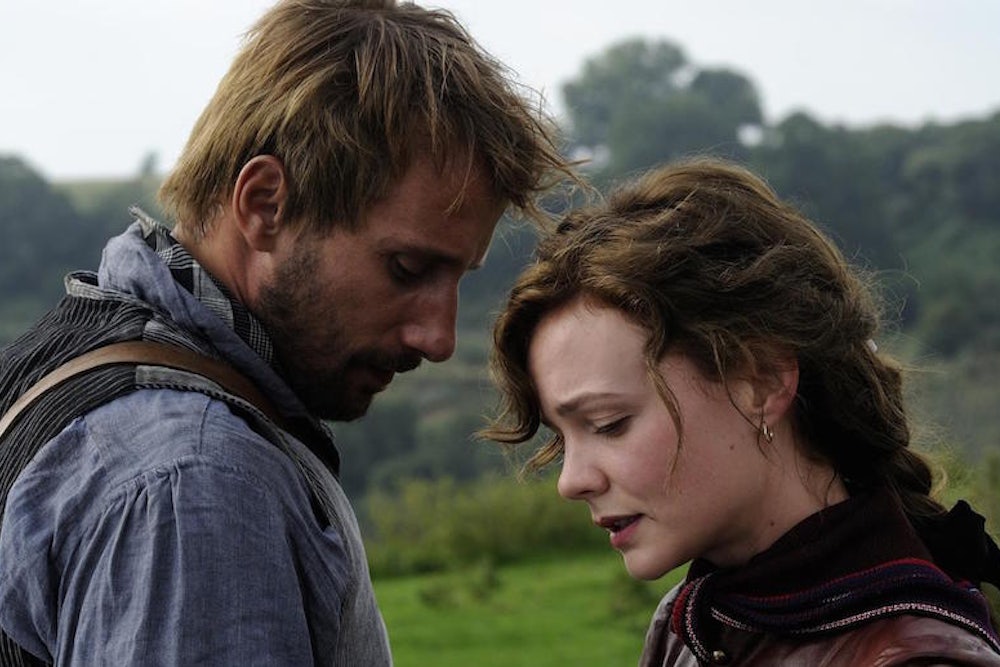“It is difficult for a woman to define her feelings in a language chiefly made by men to express theirs,” wrote Thomas Hardy in 1874 —but it’s a line that sounds so modern, so befitting our era, that it’s no wonder Far From the Madding Crowd screenwriter David Nicholls lifted it straight from Hardy’s Victorian novel for the new film starring Carey Mulligan. It’s also not hard to see why this story about a young, independently wealthy woman and her three suitors might make modern feminist hearts flutter. From its very first moment, Madding Crowd asserts Bathsheba Everdene’s singularity: The character introduces herself to the audience in a voiceover that explicitly outlines her independence; to hammer home the point, we then see her refusing to ride sidesaddle. But, in trying to create a feminist icon out of a decidedly Victorian character (just look at her name), the movie loses sight of the actual story it came to tell.
Billed as a classic love story, Madding Crowd follows Bathsheba as she inherits her uncle’s farm, decides to run it herself, and simultaneously navigates the rougher world of plows, hoes, and other farming paraphernalia, and the softer world of courtship. Bathsheba’s trio of suitors are as different as can be, and in Hardy’s novel they represent not only disparate notions of masculinity but also England’s social classes: Gabriel Oak (Matthias Schoenaerts), the sturdy (as his name suggests) shepherd who loved her before she was wealthy and stays by her side; Mr. Boldwood (Michael Sheen), the older landowner next door who wants to protect her; and Francis Troy (Tom Sturridge), the charming soldier whose mustache hints at his sinister nature. Faced with this embarrassment of riches, Bathsheba, of course, makes the wrong choice and has to deal with the consequences.
It’s this gap in Bathsheba’s overall competence that constitutes the central tension of the film. Plenty of smart women from film and literature make poor decisions in their love life (Isabel Archer, Dorothea Brooke, to name just a few of Bathsheba’s rough contemporaries), and the exploration of this tension between brilliance of the mind and fickleness of the heart has yielded plenty of believable and compelling storylines. But this film seems so zoomed in on this disjunction in her character that there’s little room for anything else. It lavishes attention on her ability to hold her own in a male world: how she’s not afraid of working alongside the men, how she craftily handles price negotiations at market, and how she stares down a threatening employee. But it also underlines how easily she is seduced and how poor her decisions are.
Ultimately, this split puts too much weight on Bathsheba’s independence. Yes, she’s a proto-feminist of an entrepreneurial stripe, but she’s also deeply embedded within a world that deems women inferior to men. Early on in the story, Bathsheba tells Gabriel, “I don’t want a husband. And if I ever were to marry, I’d want someone to tame me.” Hardy’s novel is not about a strong, independent woman succeeding in a male world; it’s an examination of the type of man it takes to tame a woman like her. “When a strong woman recklessly throws away her strength, she is worse than a weak woman who has never had any strength to throw away,” wrote Hardy, but that isn’t a characterization of womanhood that would appeal to modern audiences and certainly not the story these filmmakers wanted to tell.
In trying to make Bathsheba a modern feminist, Madding Crowd sacrifices the cohesion of the story and loses the suspense and drama that make the novel so gripping. Bathsheba is a fascinatingly complex character, but instead of airing her contradictions, the filmmakers only want her to be strong. No matter how bad it gets, she always seems in control. But if she’s in control, what’s really at stake?
It’s a shame, because Madding Crowd is a pleasure to behold. The countryside and its tillers are a Millet painting brought to life, the characters are exquisitely dressed, and the movie could not have been better cast. Schoenaerts, in particular, manages to convey depth and sensitivity by just staring at the camera and vindicates nice guys everywhere with his turn as Gabriel Oak. But like last year’s marquee British dramas, The Theory of Everything and The Imitation Game, Madding Crowd is all the more disappointing because it fails to live up to its promise. It’s beautiful, but its beauty is ultimately empty. That’s exactly the opposite of the lovely, complex woman at its center.
